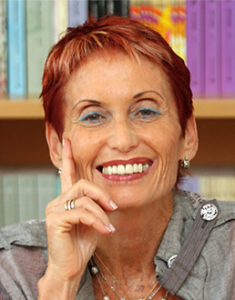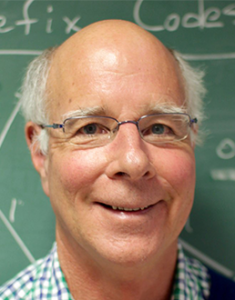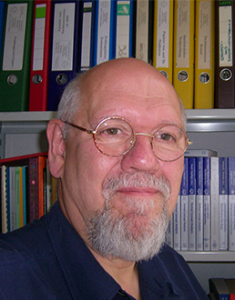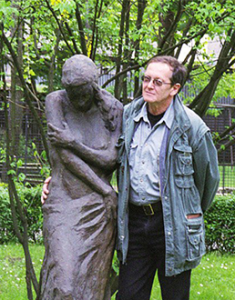Judith Gal-Ezer

Open University, Israel
Judith Gal-Ezer is a professor in the Department of Mathematics and Computer Science at the Open University of Israel. She is an expert in the teaching of computer-integrated mathematics and computer science education. She is involved in CS study programs and teacher training in Israel. Her research focuses on an algorithmic approach to the mathematics teaching, algorithmic thinking, the teaching of difficult CS subjects such as recursion, complexity and efficiency, misconceptions in CS, and many others. Judith Gal-Ezer received the 2007 SIGCSE Award for Outstanding Contribution to Computer Science Education. Prof. Gal-Ezer is a special guest of the Mayor of Poznań program Scientific Poznań.
Tim Bell

University of Canterbury, New Zealand
Tim Bell is a professor in the Department of Computer Science and Software Engineering at the University of Canterbury. He is an expert in computer science education, involved in the design and deployment of new computer science standards in New Zealand high schools. Tim Bell is a leader of the CS Unplugged project, a co-author of the interactive CS Field Guide and the book “Computer Science Unplugged”, translated into 25 languages and used around the world. His research interests include also compression and CS aspects of music. Tim Bell was awarded the 2018 SIGCSE Award for Outstanding Contribution to Computer Science Education.
Michael Fellows

University of Bergen, Norway
Michael Fellows is the Elite Professor of Computer Science at the University of Bergen and the Honorary Professor of Royal Holloway, the University of London. He is a founder of the parameterized complexity, a new branch of CS. He was awarded the von Humboldt Research Award in 2007 and the EATCS-IPEC Nerode Prize in 2014. Michael Fellows is also involved in science communication and popularization — he is a co-author of the famous book “Computer Science Unplugged”. In 2014 Michael Fellows received the International Gold Medal of Honor for Computer Science and Computer Science Education from the ETH University of Zurich.
Bernahrd Ganter

TU Dresden, Germany
Bernahrd Ganter is an emeritus professor at the Technical University of Dresden. He is a pioneer of formal concept analysis and he studied its applications in computer science, especially in data analysis and knowledge processing. Bernahrd Ganter was a member of the team of Rudolf Wille, a fameous contributor to mathematical music theory, and he was involved in the development of the experimental musical instrument Mutabor. Professor Ganter is the founder and an author of many pieces on exhibition of the mathematical museum Erlebnisland Mathematik in Dresden.
Jerzy Pogonowski

Adam Mickiewicz University, Poland
Jerzy Pogonowski is a professor at the Department of Logic and Cognitive Science at the Adam Mickiewicz University in Poznań. He is an author of more than a hundred papers devoted to applications of logic, methodology of science and philosophy of mathematics. Some of his recent publications are devoted to mathematical education on the university level. He teaches mathematics, mathematical logic, mathematical problem solving and general linguistics at the Faculty of Psychology and Cognitive Science of the Adam Mickiewicz University in Poznań.
Karl Schaffer, Erik Stern

De Anza College, USA, Weber State University, USA
Karl Schaffer is a mathematician and dancer. He teaches mathematics at De Anza College in Cupertino, California. Erik Stern is a musician, dancer, and interdisciplinary educator. He is a Professor of Dance at Weber State University in Ogden, Utah. Karl and Erik form the dance company Dr. Schaffer and Mr. Stern Dance Ensemble, world-famous for its performances and workshops on math dance. They performed in schools, museums (e.g. the Momath in New York, the National Science Museum in Seoul), at math and art conferences. Their book “Math Dance with Dr. Schaffer and Mr. Stern: Whole body math and movement activities for the K-12 classroom” unifies concepts in both mathematics and dance. (The photo was taken from from http://schafferstern.org.)
Jan Świerkowski

Catholic University of Portugal
Jan Świerkowski is a curator interested in the Art and Science of Visualizing the Invisible, with a focus on astronomy and physics. He is the leader of artsci ensemble Instytut B61, repeatedly exhibited in Poland, Portugal, Estonia, Latvia, Lithuania, and India. Instytut B61’s projects include large-scale site-specific immersive performances, pop-up exhibitions, and disruptive digital storytelling. Jan loves art, science, and trains. He was the head of Cosmic Underground, an artistic railway journey from Estonia to Portugal. Under his guidance 40 artists, scientists and designers traveled for 2 months throughout Europe by an adapted cargo train composed of 10 wagonstallations, in which an immersive exhibition about the Special Theory of Relativity was installed. He is a director of a creative cluster and co-owner of a Nicolaus Copernicus University spin-off focused on edutainment. Jan is also a researcher at the Center for Communication and Culture in Lisbon and a guest researcher at the Department of Arts and Cultural Studies at the University of Copenhagen.